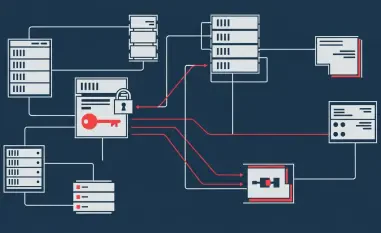NetBird, a Berlin-based company, has successfully secured €4 million in seed funding to develop their open-source network security solution. This funding round was co-led by InReach Ventures and existing investor Nauta, with additional participation from Antler and a grant from the German Federal Ministry of Education and Research. This infusion of capital underscores the support NetBird has garnered from both private and public institutions.
The newly acquired funds will be utilized to accelerate hiring, further develop products, and expand NetBird’s reach on a global scale. The company is poised to disrupt the network security market, especially as the significant adoption of hybrid work environments has altered the landscape of network security. Traditional perimeter-based defenses are being replaced by Zero Trust architectures, which operate on the principle of “never trust, always verify.” This ensures continuous authentication for all users and devices, crucial in mitigating remote access risks.
The Rise of Zero Trust Architectures
Industry Shift Towards Zero Trust
A significant driver behind the growth of Zero Trust architectures is the promotion by large cybersecurity vendors. These vendors have extensively used the term in marketing campaigns, raising awareness and contributing to the buzz around Zero Trust Networking. This change is supported by an evolving consensus in the industry that advanced security measures are required to address the complexities introduced by a distributed workforce. As organizations continue to adapt to the hybrid work model, the importance of safeguarding digital assets has grown exponentially. This has led to a broader acceptance of Zero Trust principles, as businesses recognize the need for more stringent and dynamic security measures.
The shift towards Zero Trust is not just a trend but a fundamental transformation in how organizations approach security. By treating every access request as potentially hostile, Zero Trust models aim to minimize the attack surface and prevent breaches. This paradigm shift has been accelerated by high-profile cyberattacks and data breaches, which have underscored the vulnerabilities of traditional security frameworks. As a result, companies are increasingly turning to Zero Trust solutions to protect their networks and ensure the integrity of their systems in a rapidly evolving threat landscape.
Impact of Hybrid Work Environments
The adoption of hybrid work environments has fundamentally changed network security requirements. Traditional perimeter-based defenses are no longer sufficient, as employees access company resources from various locations and devices. Zero Trust architectures, which ensure continuous authentication and verification, have become essential in mitigating the risks associated with remote access. Employees working from home or other remote locations pose unique challenges, as their devices often connect to insecure networks, creating potential entry points for cyber threats.
In this new work paradigm, organizations must implement security measures that adapt to the fluid nature of remote work. Zero Trust provides a robust framework for addressing these challenges, offering granular control over access permissions and continuously monitoring user behavior. This approach not only protects sensitive information but also enhances employee productivity by allowing secure access to necessary resources without compromising security. The growing reliance on cloud services and collaboration tools further underscores the need for comprehensive security solutions that can seamlessly integrate with various platforms and ensure a secure working environment for employees, regardless of their location.
NetBird’s Innovative Approach
Founders’ Journey and Vision
NetBird was co-founded by Misha Bragin and Maycon Santos, two engineers with a strong passion for network security and open-source development. Their journey began in Brazil while working at PSafe, a cybersecurity startup later acquired by CyberLabs. After relocating to Berlin, they participated in a founder residency program run by Antler, the most active early-stage VC in Europe. During this program, they developed a side project focused on end-to-end encryption and secure data transfer, which eventually evolved into NetBird. Their vision was to create a solution that would democratize network security and make it accessible to organizations of all sizes.
Bragin and Santos’s experience in the cybersecurity industry provided them with valuable insights into the challenges faced by businesses in securing their networks. They recognized the limitations of traditional security models and sought to develop a solution that would address these shortcomings. Their commitment to open-source principles allowed them to engage with a global community of developers and security experts, fostering innovation and collaboration. This approach has been instrumental in shaping NetBird’s development and has positioned the company as a leader in the network security space, dedicated to providing cutting-edge solutions for modern security challenges.
Core Technology and Features
NetBird’s core technology features a zero-configuration business VPN, which integrates a peer-to-peer WireGuard-based network with an intuitive access control system. Unlike traditional solutions that require complex configurations, NetBird allows administrators to manage access with simple controls, group teams and infrastructure, and define rules to limit lateral movement. This approach makes advanced security accessible even to non-technical users, aligning with NetBird’s belief that secure private networking is a fundamental right for every modern company. The platform’s user-friendly interface ensures that organizations can implement robust security measures without the need for specialized technical knowledge.
Moreover, NetBird’s use of WireGuard technology provides significant performance and security advantages. WireGuard is known for its simplicity, speed, and cryptographic strength, making it an ideal foundation for secure networking solutions. By leveraging this technology, NetBird can offer a high-performance VPN that meets the demands of modern businesses. The platform’s peer-to-peer architecture also enhances scalability and reliability, allowing it to accommodate the needs of organizations with diverse infrastructures and varying levels of complexity. This innovative approach ensures that NetBird can deliver a flexible, reliable, and secure solution that addresses the evolving needs of today’s digital landscape.
Community-Driven Development
Open-Source Success
Since its launch on GitHub in 2021, NetBird has gained significant traction among thousands of companies seeking to securely connect users and devices worldwide. The open-source, community-driven approach has been a major factor in NetBird’s success. The feedback loop from the community has allowed the company to innovate quickly, incorporating user input to enhance network security for everyone. This collaborative development model ensures that the platform evolves in response to the real-world needs of its users, making it more effective and adaptable.
The success of NetBird’s open-source strategy is evident in the rapid adoption of its platform by organizations across various industries. By making the source code available to the public, NetBird has fostered a vibrant community of developers and security professionals who contribute to its continuous improvement. This community-driven approach not only accelerates development but also enhances transparency and trust. Users can review the code, suggest enhancements, and even contribute to the project, creating a dynamic and engaged ecosystem that drives the platform’s growth and innovation.
Importance of Community Feedback
NetBird’s CTO and co-founder, Maycon Santos, emphasizes the importance of the open-source community in their development process, stating that the community’s support and feedback have been instrumental in driving innovation. Co-founder and CEO, Misha Bragin, views the recent funding round as a milestone, allowing the company to scale its mission at a time when the Zero Trust security market is rapidly growing. Bragin highlights that NetBird’s platform, which has already connected hundreds of thousands of users and devices globally, is poised to redefine secure connectivity for organizations of all sizes.
The continuous engagement with the open-source community has enabled NetBird to address emerging security challenges promptly and effectively. By incorporating diverse perspectives and expertise, the company can develop solutions that cater to a wide range of use cases and industries. This collaborative environment fosters a sense of ownership and commitment among community members, who play a crucial role in shaping the platform’s future. As NetBird continues to grow, maintaining this strong connection with the community will be key to sustaining its momentum and ensuring that its solutions remain at the forefront of network security innovation.
Investor Confidence and Market Potential
Addressing Modern Security Challenges
General Partner at Nauta, Carles Ferrer, notes the rise of remote working and distributed infrastructure has changed security requirements across businesses. Traditional VPNs present challenges such as inefficiency, cost, and being single points of failure. By combining a Mesh-VPN architecture with Zero Trust Network Access Controls, NetBird addresses these challenges, offering a more efficient, cost-effective, and secure solution. This innovative approach ensures that businesses can protect their digital assets without compromising on performance or scalability.
Ferrer emphasizes the growing need for flexible and adaptive security solutions in the face of an ever-evolving threat landscape. As cyber threats become more sophisticated, traditional security measures struggle to keep pace, leaving organizations vulnerable to attacks. NetBird’s unique combination of Mesh-VPN and Zero Trust principles provides a comprehensive defense strategy that can effectively counter these threats. By eliminating single points of failure and continuously verifying access, NetBird ensures that only authorized users can access sensitive information, reducing the risk of breaches and data loss.
Vision and Team Excellence
Zero Trust architectures have gained significant traction largely due to promotion by major cybersecurity vendors. These companies have heavily marketed the concept, raising awareness and creating buzz around Zero Trust Networking. This shift is reinforced by a growing consensus in the industry that advanced security measures are essential to tackle the complexities of a distributed workforce. As organizations embrace hybrid work models, the need to protect digital assets has surged, leading to wider acceptance of Zero Trust principles. Businesses now recognize the importance of stringent and dynamic security measures.
Transitioning to Zero Trust is more than just a passing trend; it represents a fundamental change in how organizations handle security. By treating every access request as potentially malicious, Zero Trust frameworks aim to reduce the attack surface and prevent breaches. This paradigm shift has been driven by high-profile cyberattacks and data breaches, which have exposed the weaknesses of traditional security approaches. Consequently, more companies are adopting Zero Trust solutions to safeguard their networks and maintain the integrity of their systems in an ever-evolving threat landscape.













